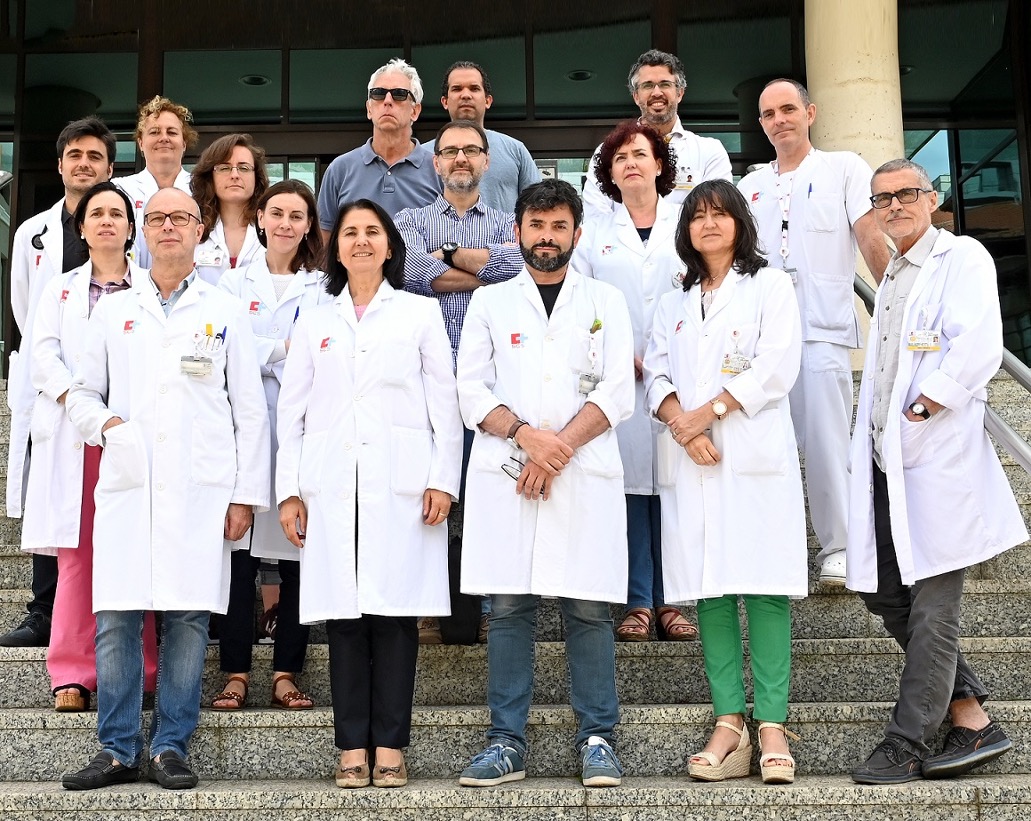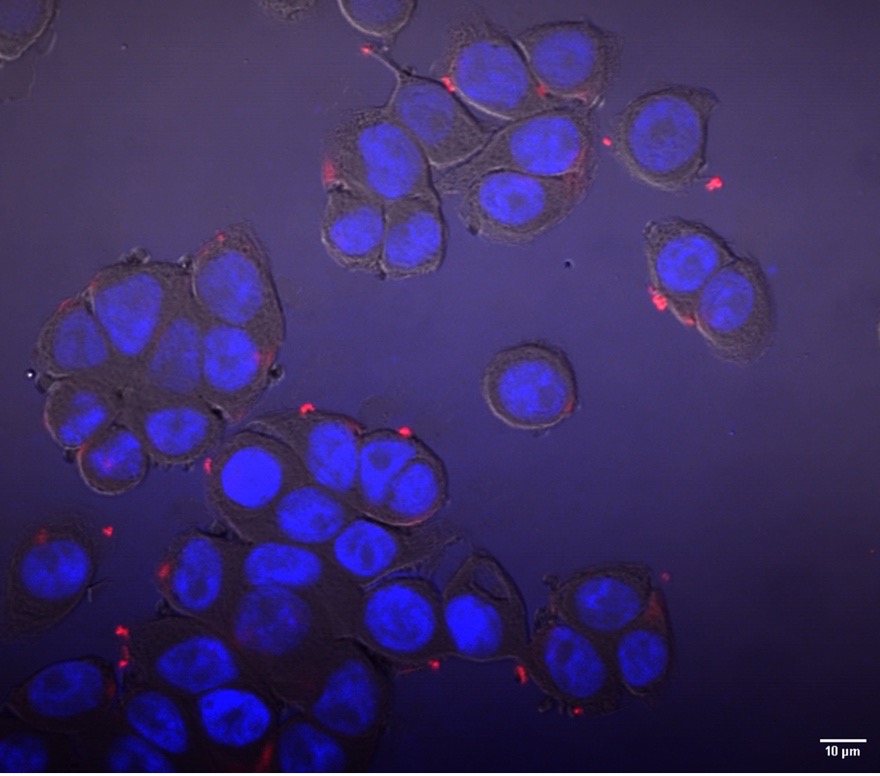
Group photo. Group “Epidemiology and pathogenic and molecular mechanisms of infectious diseases and clinical microbiology”
The team is made up of professors from the University of Cantabria, doctors from the Marqués de Valdecilla University Hospital and researchers from IDIVAL. It is part of the National Network for Research in Infectious Pathology (REIPI).
The main lines of research are:
– Mechanisms of antimicrobial resistance and molecular epidemiology of Gram-negative and Gram-positive bacteria of medical interest.
– New methods for microbiological diagnosis based on genomics and proteomics.
– Pathogen-host interaction.
A summary of recent work carried out with strains of corynebacteria of clinical origin is presented.
Corynebacteria belong to the genus Corynebacterium spp. and they have a club-shaped morphology. They are Gram-positive, non-sporulated, catalase-positive, and their genome is rich in guanine and cytosine. Some are environmental bacteria, but most are part of the skin and mucosa flora in humans and other mammals. Clinically relevant corynebacteria are Corynebacterium diphtheriae (which causes diphtheria) and non-diphtheria corynebacteria. Among these we highlight Corynebacterium striatum, Corynebacterium amycolatum and Corynebacterium urealyticum (Bernard, 2012).
Identification at the species level is carried out using phenotypic, chemotaxonomic and molecular techniques. The API-Coryne commercial system is widely used, but sometimes complementary biochemical tests have to be used for differentiation at the species level. For some years, MALDI-TOF mass spectrometry technology has been implemented for bacterial identification thanks to its speed, reliability and low cost. In a preliminary study carried out in collaboration with the group of Professor Jordi Vila (Hospital Clínico, Barcelona) we demonstrated the effectiveness of the application of this technology for the identification at the species level of a collection of clinical strains of Corynebacterium spp, Listeria monocytogenes and Rhodococcus equi (Village et al., 2012). The results were confirmed in a study conducted with strains of Corynebacterium ., 2012). The results were confirmed in a study conducted with strains of et al., 2012). The results were confirmed in a study conducted with strains of Rhodococcus equi ., 2012). The results were confirmed in a study conducted with strains of et al., 2012). The results were confirmed in a study conducted with strains of rpoB ., 2012). The results were confirmed in a study conducted with strains of

Interaction between Corynebacterium striatum and human lung epithelium cells
Antimicrobial resistance is one of the most important challenges facing medicine on a global scale. The study of the mechanisms of bacterial resistance to antibiotics and its spread is a priority line of research in our group. In relation to antimicrobial activity and resistance, we have conducted studies in Corynebacterium striatum, an emerging opportunistic pathogen that can cause a wide variety of infections in humans: bacteremia, endocarditis, meningitis, vaginitis, and infections of the urinary tract, respiratory tract, wounds, skin, and eyes. C. striatum it is recognized as a true pathogen when isolated from samples taken repeatedly from sterile parts of the human body or from catheters or other devices. The consideration of whether an isolate represents infection, colonization or contamination is made based on the criteria of the physician. Infections by Corynebacterium spp. they are treated with glycopeptides (vancomycin and teicoplanin). Linezolid is a good alternative, because so far no resistance has been reported. However, these antimicrobials are not always available in all hospitals. In a study we conducted at the F. Hached hospital in Sousse (Tunisia), we were informed that the treatment of choice for infections by C. striatum in that hospital is ampicillin. However, analyzing the susceptibility to 16 antimicrobials of 63 strains of C. striatum in that hospital is ampicillin. However, analyzing the susceptibility to 16 antimicrobials of 63 strains of et alin that hospital is ampicillin. However, analyzing the susceptibility to 16 antimicrobials of 63 strains of C. striatum in that hospital is ampicillin. However, analyzing the susceptibility to 16 antimicrobials of 63 strains of C. striatumin that hospital is ampicillin. However, analyzing the susceptibility to 16 antimicrobials of 63 strains of et al., 2016), so they can be prescribed as an alternative or complementary treatment of infections by C. striatum., 2016), so they can be prescribed as an alternative or complementary treatment of infections by
References
Bernard K., 2016), so they can be prescribed as an alternative or complementary treatment of infections by Corynebacterium ., 2016), so they can be prescribed as an alternative or complementary treatment of infections by
., 2016), so they can be prescribed as an alternative or complementary treatment of infections by., 2016), so they can be prescribed as an alternative or complementary treatment of infections by Corynebacterium ., 2016), so they can be prescribed as an alternative or complementary treatment of infections by Arcanobacterium haemolyticum, and Rhodococcus equi ., 2016), so they can be prescribed as an alternative or complementary treatment of infections by
., 2016), so they can be prescribed as an alternative or complementary treatment of infections by ., 2016), so they can be prescribed as an alternative or complementary treatment of infections by Corynebacterium ., 2016), so they can be prescribed as an alternative or complementary treatment of infections by
., 2016), so they can be prescribed as an alternative or complementary treatment of infections by ., 2016), so they can be prescribed as an alternative or complementary treatment of infections by Corynebacterium striatum as an emerging antibiotic-resistant nosocomial pathogen in a Tunisian hospital. Scientific Reports. 7(1):9704 (https://doi: 10.1038/s41598-017-10081-y).
Ruiz de Alegría et alas an emerging antibiotic-resistant nosocomial pathogen in a Tunisian hospital. Scientific Reports. 7(1):9704 (https://doi: 10.1038/s41598-017-10081-y). Rhodococcus equi and Diet as an emerging antibiotic-resistant nosocomial pathogen in a Tunisian hospital. Scientific Reports. 7(1):9704 (https://doi: 10.1038/s41598-017-10081-y).
as an emerging antibiotic-resistant nosocomial pathogen in a Tunisian hospital. Scientific Reports. 7(1):9704 (https://doi: 10.1038/s41598-017-10081-y). as an emerging antibiotic-resistant nosocomial pathogen in a Tunisian hospital. Scientific Reports. 7(1):9704 (https://doi: 10.1038/s41598-017-10081-y). aph and as an emerging antibiotic-resistant nosocomial pathogen in a Tunisian hospital. Scientific Reports. 7(1):9704 (https://doi: 10.1038/s41598-017-10081-y). as an emerging antibiotic-resistant nosocomial pathogen in a Tunisian hospital. Scientific Reports. 7(1):9704 (https://doi: 10.1038/s41598-017-10081-y). Corynebacterium striatum clinical isolates. as an emerging antibiotic-resistant nosocomial pathogen in a Tunisian hospital. Scientific Reports. 7(1):9704 (https://doi: 10.1038/s41598-017-10081-y).
